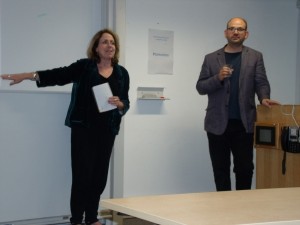WSI Distinguished Lecture with Tom Steinberg
Has the landscape of technology for good changed irrevocably since 2008? – An evening with Tom Steinberg
Friday 8th July, 2016 – The Web Science Institute were delighted to host a Distinguished Lecture with Tom Steinberg, founder of mySociety, and leading expert on technologies for good. Tom spoke to an enthusiastic audience on the topic of ‘Digital Technologies in the Public Interest’.
The world of technology for good is changing and Tom’s challenge for academics working in Web Science is to step up to these new challenges. He began the evening with a summary of where we’ve come so far. The three key approaches that technologies in the public interest have taken in the past are:
-
Approaches to make the tech work
Since the 1990s, a number of groups have worked on building technologies to make the internet work. Obvious examples would be the World Wide Web, Linux, OpenSSL, and Firefox, which provide open source code to allow things to happen on the web.
-
Approaches that directly deliver benefits
Other groups have aimed to harness those technologies for public good. Examples would include Southampton’s own MOOCs project, but also services such as Crisis text line, an American SMS service which supports those in crisis has had some success getting viral posts taken down.
-
Exerting Power
The final group are interested in influencing those in power. The Tor project, although subject to misuse, was an attempt to give power back to those who want to protect their privacy. Another approach is the use of hashtags, such as #BlackLivesMatter to unite disconnected users under one campaign heading.
The last successful example of the first approach, producing a technological object, was in 2008 with the launch of the Raspberry Pi. More recent successes, such as the resurgence of feminism or Donald Trump’s rise to influence, were carried out without websites or apps. Instead, campaigners embedded their messages in existing technologies, such as Twitter, You Tube or Facebook. Is it possible that we’ve passed the peak of public interest technology projects?
At the same time, large providers of on line services have begun taking more direct initiatives. Facebook have introduced the safety check button, which shows up on your screen if you are geographically located in a danger zone. It is estimated that the ‘I’m safe’ buttons were viewed by hundreds of millions of friends or relatives during the Paris attacks. Google are actively campaigning to get people to go and vote on election days. In many other examples, the traditional gatekeepers now seem to be taking more direct action in terms of the content they produce.
A new phase seems to be coming, where mitigation is possibly the only option left to public interest groups, and it needs to happen within the business structures of the large gatekeepers. This will inevitably generate legal challenges and a redefinition of the role between those companies and the governments of wealthy nations. There is a place for individuals to question the power held over them, too. The publication of Cathy O’Neil’s Weapons of Math Destruction in September 2016 challenges the power that algorithms and big data have, having been linked to increases in inequality and threatening democracy. The need for Web Science to understand and unpick these trends has never been greater.
Tom finished with more questions than answers, and plenty of challenges for researchers in the field, including:
Are these trends really happening?
What demands will citizens start making on the gatekeepers?
Can public interest projects operate outside of the robust business models of Google, Facebook and Twitter?
Will governments start challenging the gatekeepers’ power?
You can see Tom’s presentation in full via our video livestream.
About Tom
Tom was an early pioneer in civic technology websites that focus on holding power to account. He was the founder of mySociety, a charitable organisation that brought websites such as Fixmystreet, and Whatdotheyknow, supporting journalists and the wider public to challenge government in the UK. mySociety was also active in promoting similar innovations in many countries around the world. He stepped down from his role as Director in 2015 to concentrate on new projects. His strong background in government technology strategy and his experience in open government initiatives are arguably unrivalled in the UK.
